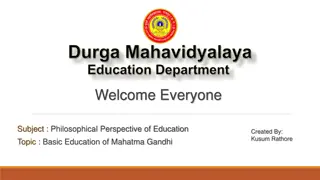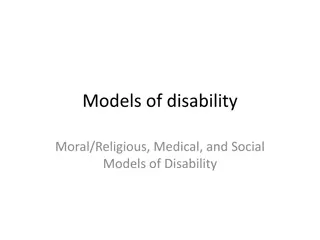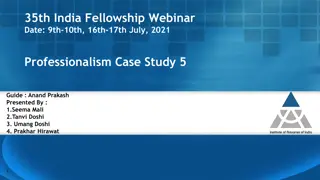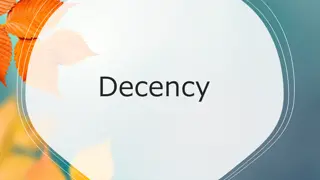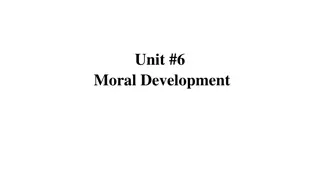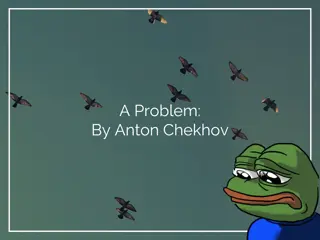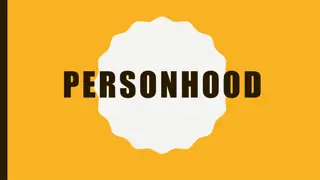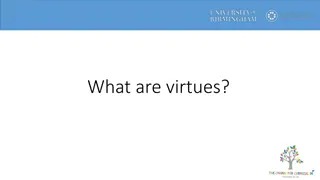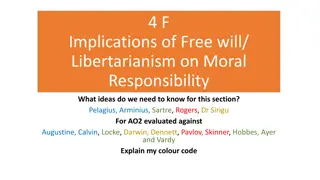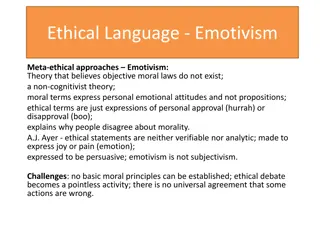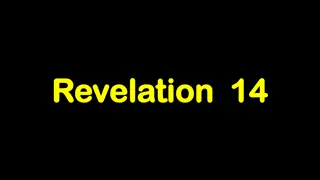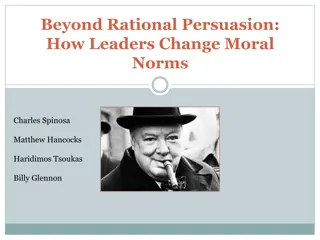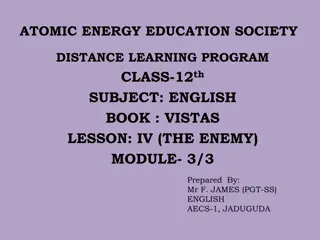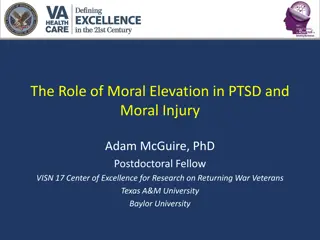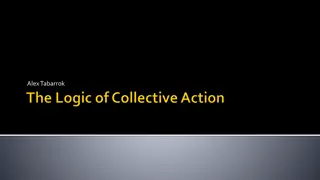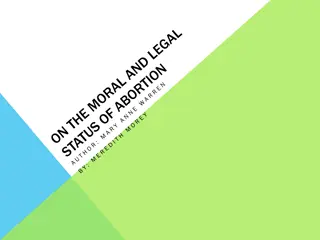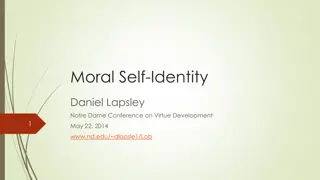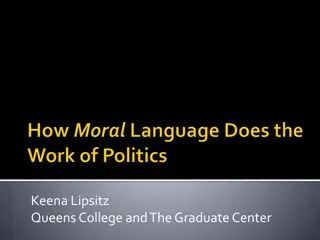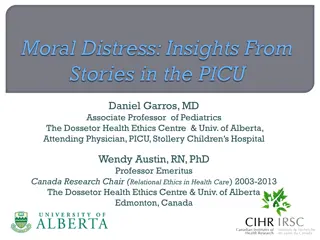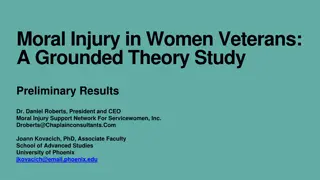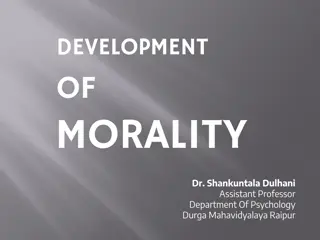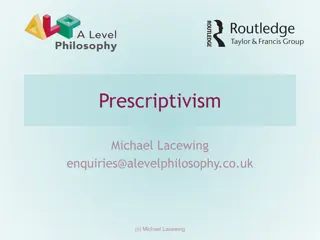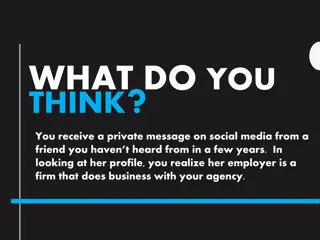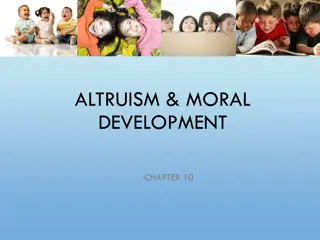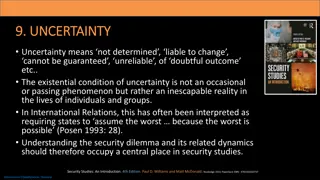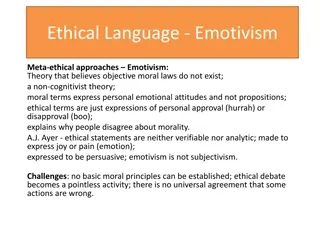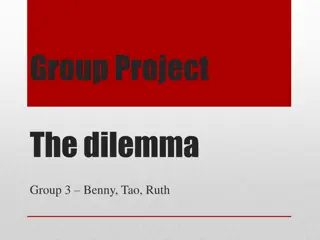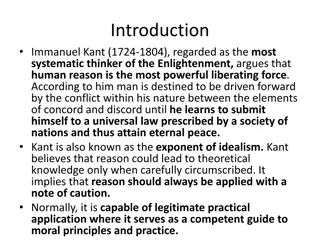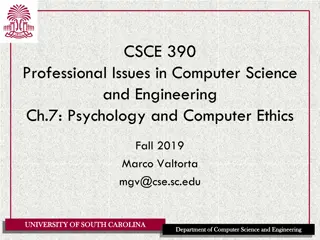Uncovering the Violent History of Capitalistic Enclosures
Explore the historical context of capitalist enclosures, their violent impacts on peasants, and the moral justifications used to conceal these atrocities. Delve into how economic narratives created moral bubbles to justify violent acts, as examined through the lens of Marx's analysis. Unveil the par
1 views • 11 slides
Durga Mahavidyalaya
Education is viewed as the acquisition of knowledge, skills, beliefs, and moral habits. Mahatma Gandhi introduced his Basic Education concept emphasizing free and compulsory education, mother tongue instruction, craft-centered learning, moral education, and character building. The curriculum include
0 views • 6 slides
Understanding Models of Disability: Moral, Medical, and Social Perspectives
The concept of disability is explored through moral/religious, medical, and social models. Impairment refers to a loss or abnormality in structure or function, while disability is a restriction in performing activities. The discussion also delves into the significance of person-first language and th
1 views • 35 slides
Case Study on Professionalism: Ram's Dilemma at Fatafat Life Insurance Company
Ram faces ethical challenges in his new role as Appointed Actuary at Fatafat Life Insurance Company. From accepting the position without proper due diligence to being coerced into unethical practices by the CEO, he finds himself in a dilemma regarding regulatory compliance and integrity. This case s
0 views • 36 slides
Cultivating Decency and Moral Excellence in Daily Life
Embrace a life of decency and moral refinement through moderation, purity, and vigilance. Uphold virtues of modesty, temperance, and clean-mindedness in all aspects of existence, fostering an environment of respect and dignity. Strive to elevate your character towards the divine, embodying qualities
0 views • 18 slides
Understanding Kohlberg's Stages of Moral Development
Kohlberg's stages of moral development, built upon Piaget's psychological theory, outline six developmental stages of moral reasoning, with each stage offering a higher level of response to moral dilemmas. Kohlberg focused on justice in moral development and emphasized the importance of how individu
0 views • 19 slides
Understanding Moral Development and Moral Reasoning
Moral development involves an individual's sense of right and wrong, influenced by family, school, friends, and societal environment. Children learn moral concepts from interactions with parents, teachers, peers, and society, shaping their understanding of good and bad. Additionally, moral reasoning
0 views • 13 slides
A Problem: Analysis of Family Honor and Moral Dilemmas in Anton Chekhov's Work
Explores the moral dilemma faced by the Uskov family when dealing with Sasha's forgery and non-repayment, highlighting the differing views of paternal uncles and the eventual realization of Sasha's criminal tendencies despite the family's attempts to spare him from punishment.
0 views • 19 slides
Understanding Personhood: Philosophical Perspectives on Moral Consideration
Exploring the concept of personhood involves delving into what it means to be part of a moral community and deserving of moral consideration. Various criteria, from genetic to cognitive and social, are discussed, shedding light on the complex debates surrounding animal rights, abortion, euthanasia,
0 views • 10 slides
Understanding Virtues and Practicing Ethical Behavior
Virtues, such as resilience, compassion, and integrity, represent moral excellence. Practicing virtues leads to a good life, according to Aristotle. By understanding virtues like gratitude and reasoning, individuals can cultivate a sense of moral responsibility and ethical behavior. The concept of t
0 views • 8 slides
Moral Responsibility and Free Will Implications in a Contemporary Context
This text delves into the implications of free will and libertarianism on moral responsibility, examining the ideas of various philosophers and thinkers such as Pelagius, Arminius, Sartre, and more. It explores the concepts of moral agency, determinism, normative ethics, religious beliefs, and the c
5 views • 12 slides
Understanding Emotivism in Ethical Philosophy
Emotivism is a meta-ethical theory that rejects objective moral laws, instead positing that moral terms express personal emotional attitudes, not universal truths. Influenced by A.J. Ayer and rejecting naturalism, this theory suggests that ethical statements are not objective propositions but rather
0 views • 28 slides
Understanding the Saints' Dilemma in Revelations
The dilemma faced by the Saints in the book of Revelations is whether they can bow down to the beast (Caesar) to receive a certificate of worship, seek forgiveness, worship God, and still attain salvation. The passages in Revelations 14 and 20 highlight the consequences of worshipping the beast, emp
0 views • 14 slides
Leadership and Moral Norm Change: Beyond Rational Persuasion
This study explores how formal leaders can change moral norms through morally risky actions, with the participation of followers. It delves into the theory of moral entrepreneurship, practice-based leadership, and institutionalism to understand how leaders embedded in practices bring about radical n
0 views • 5 slides
Sadao's Dilemma: The Enemy's Escape
Sadao, a skilled surgeon, faces a moral dilemma when treating an American soldier in secrecy. Despite planning for the soldier's disposal, he ultimately aids in the soldier's escape, leading to conflicting emotions and confrontations with the General. The story delves into themes of duty, loyalty, a
0 views • 7 slides
Challenges and Opportunities of Moral Revolution in Indonesia
The need for a moral revolution in Indonesia to address societal issues like corruption, conflict, and intolerance. Contrasting mental and moral revolutions, the focus is on behavior change to build a humane society with healthy moral values. Initiatives and discussions highlight the urgency of tran
0 views • 13 slides
Ethical Dilemma in Engineering: Minimizing Adverse Effects
Jean Smith, a self-employed engineering consultant, faces an ethical dilemma as she is pressured by her client to tailor an environmental impact statement to hide negative impacts of a tunnel construction project. She contemplates selective use of data and methodologies to meet client expectations w
0 views • 50 slides
Understanding Moral Elevation in PTSD and Moral Injury
The research by Dr. Adam McGuire explores the role of moral elevation in PTSD and moral injury, emphasizing how witnessing virtuous behaviors triggers emotional and physical responses leading to a desire for imitating virtuous acts. By integrating prosocial emotions into trauma treatment, the positi
0 views • 13 slides
Challenges of Cooperation and Collective Action in Achieving Common Goals
Cooperation towards common goals poses challenges due to the nature of public goods, as highlighted through scenarios like draining a shared swamp and government-provided public goods. The dilemma of collective action, illustrated by the Prisoner's Dilemma and lobbying for collective benefits, point
0 views • 14 slides
Understanding Humanity and Moral Community in the Context of Abortion Ethics
Exploring the complex ethical considerations surrounding abortion, this discussion delves into determining the humanity of a being, defining the moral community based on traits of personhood, fetal development, and the right to life. The arguments include the morality of abortion, the definition of
0 views • 9 slides
Challenges to Moral Anti-Realism: Objections and Responses
The article explores objections to moral anti-realism, including moral nihilism, condemning immorality, and the notion of moral progress in the absence of moral reality. It addresses concerns about the justification for interfering with others' behavior, the relationship between moral beliefs and ob
0 views • 6 slides
Understanding Moral Self-Identity Development
Situating moral self-identity within ethical theory and developmental psychology, this overview explores the centrality of morality within the self-concept. It discusses the chronic accessibility of moral schemas, the importance of strong evaluation in moral behavior, and the connection between mora
0 views • 33 slides
Understanding Moral and Constitutional Values in Relation to Judiciary
Explore the concepts of moral values and constitutional values, emphasizing their importance in decision-making processes and societal norms. Discover the stages of moral development and delve into constitutional values such as sovereignty, socialism, secularism, democracy, justice, liberty, equalit
0 views • 9 slides
Analysis of Moral Language in Political Communication
Explore how Republican and Democratic elites use distinctive moral language and its impact on voters in the context of the 2012 election data. Discover the application of Moral Foundations Theory in understanding political differences in the United States and how moral intuitions influence public op
0 views • 13 slides
The Influence of Disgust on Moral Behavior in Psychological Research
Explore the impact of disgust on moral behavior through various studies, including moral dilemmas and criteria for moral judgment. Research delves into how disgust affects decision-making processes related to moral dilemmas and helping behavior. Discover the connection between physical disgust and i
0 views • 16 slides
Understanding Moral Distress in Healthcare
This content discusses the concept of moral distress in healthcare, defined as the pain and anguish experienced when one knows the right thing to do but faces internal or external barriers preventing action. It explores the implications of moral distress on healthcare practitioners and emphasizes th
0 views • 25 slides
Insights on Moral Injury Among Women Veterans: Preliminary Study Findings
Preliminary results from a grounded theory study on moral injury in U.S. women veterans reveal themes such as sexual assault, hostile work environments, and more. Participants shared their experiences, highlighting the nature of moral injury they faced, distinguishing between various forms of discri
0 views • 21 slides
Understanding Moral Development: Insights and Perspectives
Morality is the belief in right behavior accepted by society. It involves moral behavior, feelings, and judgments. Moral development evolves from childhood to adulthood, influenced by experiences and challenges. Freud's id, ego, and superego theory and Skinner's behaviorism contribute to our underst
0 views • 12 slides
Exploring Moral Judgments and Prescriptive Meaning in Ethics
This content delves into non-cognitivism, Hare’s prescriptivism, and moral anti-realism to understand what we do when making moral judgments. It discusses prescriptive meaning, the concept of good, and how moral language guides actions. The objections raised regarding moral language's functions, p
0 views • 9 slides
Ethical Dilemma: Friend Message from Agency Partner
Receiving a message from a long-lost friend on social media reveals that she works for a firm that does business with your agency, posing an ethical dilemma. Considering loyalty to the law, selfless service, and responsible stewardship, how should you navigate this situation?
0 views • 4 slides
Understanding Altruism and Moral Development Theories
Explore the components of morality, theories of moral development by prominent psychologists like Piaget and Kohlberg, and the stages of moral development in individuals. Learn about moral affect, reasoning, and behavior as integral aspects shaping one's ethical framework and decision-making process
0 views • 40 slides
Understanding the Security Dilemma in International Relations
Uncertainty is inherent in the lives of individuals and groups, leading to the need for states to assume the worst in international relations. The security dilemma, conceptualized as a two-level strategic predicament, revolves around interpreting the intentions and capabilities of others and decidin
0 views • 12 slides
Friedrich Nietzsche's Genealogy of Morals: Uncovering the Evolution of Moral Values
Friedrich Nietzsche critiques traditional philosophy for overlooking the historical development of moral concepts. He argues that moral judgments were initially based on strength and power, later evolving into the dichotomy of master and slave morality. By tracing the genealogy of moral terms, Nietz
0 views • 10 slides
Understanding Emotivism: A Non-Cognitivist Theory in Ethics
Emotivism is a meta-ethical theory that posits the absence of objective moral laws, suggesting moral terms express personal emotional attitudes rather than propositions. Influenced by philosophers like A.J. Ayer and Hume, it challenges the existence of basic moral principles and universal agreement
0 views • 23 slides
Marriage Dilemma: Choosing Between Two Suitors
A man, 25, faces a dilemma between two women who want to marry him. Girl A is beautiful but less smart, loves gaming, smoking, and drinking, while Girl B is smart, gentle, and dislikes vices. The man values parental approval, friend approval, and future family considerations. He must decide between
0 views • 12 slides
Ethical Dilemma in Aircraft Maintenance: Quality vs. Compliance
An aircraft maintenance team faces an ethical dilemma when instructed to replace pump casing studs with poor quality replacements, potentially compromising safety. Despite pressure to comply, the engineer must navigate between upholding reputation and ensuring safety.
0 views • 38 slides
Kant's Moral Philosophy: Reason, Freedom, and the State
Immanuel Kant, a prominent Enlightenment thinker, emphasizes the liberating power of human reason in guiding individuals towards moral principles and practices. Kant's moral philosophy centers on treating each person as an end-in-itself, driven by the good will informed by reason. His concept of mor
0 views • 14 slides
Kohlberg's Stages of Moral Development in Computer Ethics
This content explores Kohlberg's Stages of Moral Development in the context of computer ethics, focusing on an ethical dilemma involving Heinz stealing a drug to save his wife. It discusses the different levels of moral reasoning, from pre-conventional to post-conventional morality, and how individu
0 views • 12 slides
Forms of Moral Reasoning and Ethics in Decision-Making
Explore the main forms of moral reasoning in ethical decision-making, including virtue ethics, deontological reasoning, and teleological reasoning. Understand the importance of developing ethical virtues and principles in guiding behavior. Delve into examples of reasoning from virtue and deontologic
0 views • 28 slides
Engineering Ethics in Practice: A Guide for Engineers - Dilemma Faced by Corsey Mining
Corsey Mining, a multinational company, faces a dilemma in a new gold mining project where bribery is proposed in exchange for a license. The company must decide whether to uphold ethical standards or pursue the opportunity, balancing profit with integrity in a complex situation.
0 views • 47 slides

